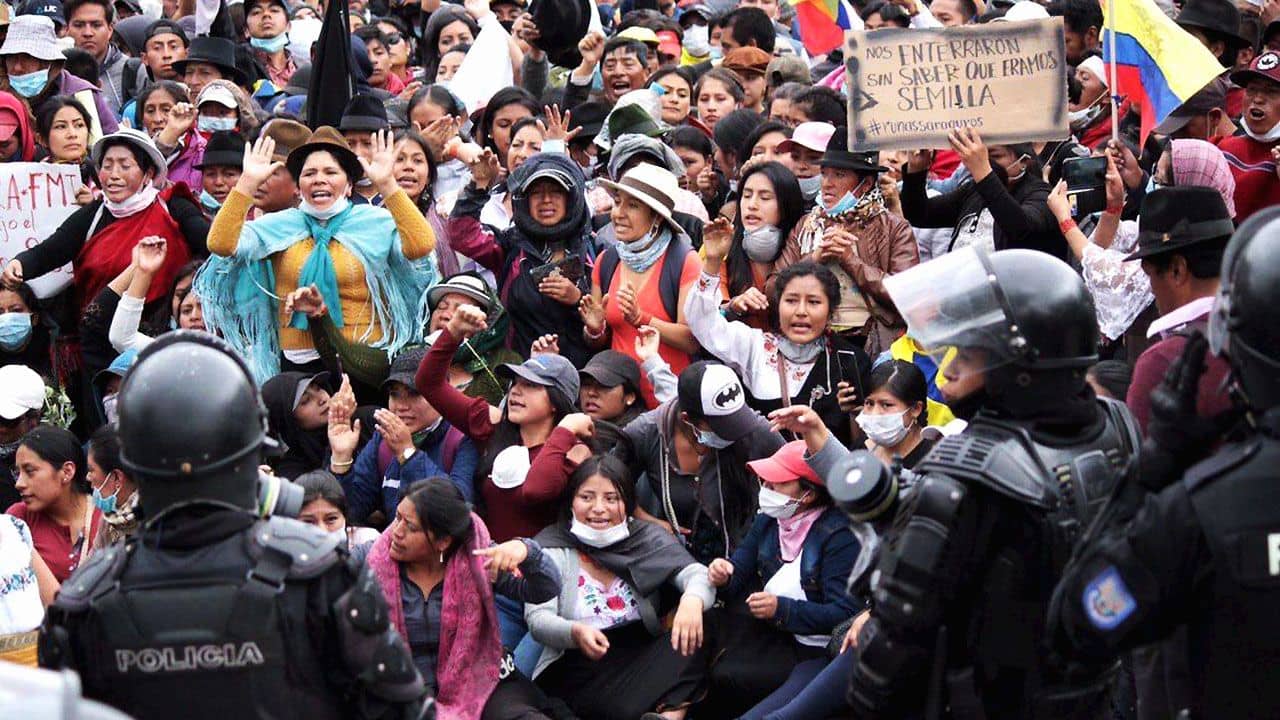
During the 11-day national strike and demonstrations of the indigenous movement and other social sectors of Ecuador, from 3 to 13 October 2019, the Ombudsman's Office registered a total of 11 people killed, including a 15-year-old minor in Durán. 1,192 people were arrested, 76% of which were arbitrarily and illegally detained. 1,340 people were injured. 11 of them lost an eye. One person lost one eye and suffered a 90% vision loss in the other eye. Another person lost hearing in one ear after the presumed impact of a teargas bomb. These are not just figures: they represent the lives of human beings who have been violated by the excessive use of public force.
The serious political, social and economic crisis that Ecuador is experiencing has drawn the attention of the international community. At the end of the ‘90s, we had already been victims of a neoliberal, social, political, and economic crisis in Ecuador, which forced us on a painful migration to several countries of the world, especially to Europe. And, for the sake of our families and the Ecuadorian citizens, we are not willing to go through it again.
Two and a half years after the government of President Moreno came to power, the livelihood of most Ecuadorians has deteriorated significantly. National poverty has increased 2.4 percent, from 23.1% in June 2017 to 25.5% in June 2019. Extreme poverty has increased from 8.4% in June 2017 to 9.5% in June 2019. Almost 6 million people (35% of the total national population of 17 million) live either in poverty or in extreme poverty. GDP growth has also slowed down. In 2017, GDP grew by 3%. In 2018, it grew by 1.4%. Growth in 2019 is expected to be 0.2%. These figures from the National Institute of Statistics and Census of Ecuador show us an obvious stagnation of the Ecuadorian economy and the impoverishment of its population.
In this socio-economic context, on 1 October 2019, President Moreno issued the Executive Order No.883, which contained a series of neoliberal economic measures known as “the package”, directly affecting the Ecuadorian population. The President also announced the introduction of an economic, financial, monetary, and labor bill that would effectively deepen inequalities in the country and cause a major regression of workers' rights.
These measures most likely fulfilled the commitments taken after the agreement between the Ecuadorian government and the International Monetary Fund (IMF) to receive a USD 4,200 million loan. In accordance with the Constitution of the Republic of Ecuador (Article 419), international treaties that compromise the economic policy of the State under conditions imposed by international financial institutions and containing the commitment to issue, modify or repeal a law, require the approval of the Assembly National prior to ratification or denunciation. However, these agreements were never referred to the National Assembly.
The government, even knowing that it would propose economic measures that would affect almost all Ecuadorian social sectors except for the wealthiest - beneficiaries of these measures - did not foster prior dialogue and consensus with the different economic and social actors directly involved. In fact, a few days before the announcement of this economic package, the Vice President of the Republic publicly stated that he hoped “that the citizens would understand these measures”, instead of discussing them with social actors.
On 3 October, after the announcement of the economic measures, the Union of Transport Workers declared a national strike. Student organizations, women, ecologists, retirees, workers, and other social organizations joined the Union of Transport Workers to demonstrate peacefully. On 4 October, the uprising of the indigenous movement began, led by the Confederation of Indigenous Nationalities of Ecuador (CONAIE), who came from all over the country and gathered in Quito and the capital cities of different provinces, including Guayaquil, Cuenca, Ambato, Riobamba, Guaranda, Ibarra, Latacunga, Puyo, Macas, Tena, and others.
In response to the unemployment and social protest, on 3 October, President Moreno issued Executive Order No. 884 and declared a State of Emergency throughout the national territory for the maximum time allowed by the Constitution (60 days), including a 9-hour curfew from 20:00 to 05:00 hrs. This curfew was extended to 24 hours on 12 October, without respecting the principles of proportionality, legality, temporality, territoriality, and rationality, and thus violating international standards. On 7 October, the Constitutional Court issued an opinion on the constitutionality of the measure, which reduced the State of Emergency to 30 days.
This indigenous uprising and peaceful social protest temporarily ended on 13 October, when negotiations between the national government and CONAIE began. The position of the latter was that the Executive Order No.883 should be repealed, which was finally achieved. However, now several leaders of the indigenous movement are being unfairly accused of rebellion, kidnapping, and terrorism.
Trying to minimize the massive social uprising against the measures contained in Executive Order No.883 and hide the obvious economic disaster of the last two years in the country, President Moreno accused once again former President Rafael Correa and related political leaders of the situation in Ecuador.
We urge the competent authorities to respect the human, political and civil rights of all citizens and all members of the National Assembly of the Republic of Ecuador, democratically elected at the polls, who represent the people through the legitimate diversity of thought and political action. We call on regional and global international organizations in charge of protecting, promoting, and guaranteeing the human, civil, and political rights of all citizens, to obtain information and objectively analyze the situation of violation of human, political and civil rights during and after the social protests of October in Ecuador, and during the State of Emergency.
Esther Cuesta Santana, Ph.D
Member of the National Assembly for the Constituency of Ecuadorian citizens living abroad, Europe, Asia, and Oceania
PGA member


